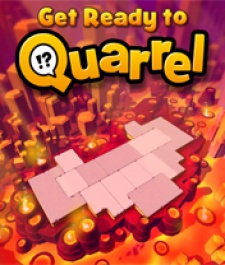That's not just a mantra for developers seeking to foster a reputation for quality releases, but rather a necessity for studios fighting for space in an increasingly crowded marketplace.
As detailed by Denki's creative director Gary Penn and Jamie Firth - production manager at publisher UTV Ignition taking time to ensure word-based strategy release Quarrel met up to their own high expectations was never going to result in a quick turn around, but it's certainly paying off now.
As this article goes live, Quarrel on iOS has just picked up a Scottish BAFTA for best game.
We caught up with Gary and Jamie to find out how they created their award winning wordy wonder.
Pocket Gamer: Can you tell us a bit about Denki?
Gary Penn: From our glamorous Dundee boutique we make digital toys and games for your discerning punter.
Denki started in March 2000 with the aim of making smaller, tighter, jollier, original stuff, refining a development process and reducing the gap between maker and player at a time when digital distribution and the Internet wasnt the reality it is today.
We started with GBA when there was the possibility of that being a direct-download platform, and we fleshed out this whole universe for Denki Blocks!, complete with a funky puzzle construction tool and a marketplace and puzzle ranking system, but we only got to make the main game in the end and the GBA pretty much turned into just another merchandising medium for established brands.
When the possibility of developing for Sky set top boxes came along in 2001 we saw it as a more direct route to an audience, so we pursued that for a while with six microteams and did some cracking work: over 150 games in the end, most of them very popular and more playable than the platform ought to allow, because in reality it's little more than an MPEG streamer.
We also did a good wedge for DirecTV in the US, which was a delightfully limited HTML-based set top box that was painful to work on at times but youd get a real kick out of working around the severe limitations.
But that all became too brand-focussed and we wanted to get back into wholly original work again so we started the 'Dragons' Denki' pitching process you'd never guess what that was inspired by. There were three Denki Directors with cash in the form of working weeks and youd come along to try to convince them to fund the development of a prototype or pilot.
We also set up a microteam to make pilot versions of concepts to sell. That was me, a coder and an artist and we visualised and made all sorts of things, some things more evolved than others. Quarrel in one of its earliest forms was one of those things.
There were also some experiments that never gained traction; some block-based puzzlers including a 3D Denki Blocks!, which didnt really work - but some of the things that did work you should see in the coming year or so.
Can you explain the inspiration behind Quarrel?
GP: The original concept came at a time when we were playing Dice Wars and messing around with all sorts of mashups - some drawn from a hat, some from a flash of inspiration, like Quarrel.
It was the first idea to make it through 'Dragons' Denki' because it had that different yet familiar quality to it and there was a confidence that it was at least worth exploring.
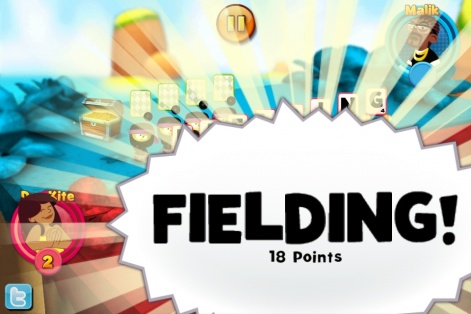
Why did you think a Risk-style strategy and anagrams went well together?
GP: It does feel a bit like the gaming equivalent of something that Heston Blumenthal might serve up at The Fat Duck: I'm not sure why the two styles work well together, they just do.
The game has been 'in development' for a long time, so how did the concept change during that time?
GP: It's evolved, that's for sure, but it's remained true to our guiding lights, which include playing against entertaining artificial players who perform for your benefit and aren't obviously fake, making the strategy part invisible and feel more like an action game, and using the richest possible word list with a definition for every word.
As part of its evolution, Quarrel's been built a few times over the years - from early prototypes to a 3D pilot, board game, iOS and Xbox versions. There was even a cool 'live' version we were going to play with real people in Nottingham city centre at GameCity a few years back but, sadly, that never happened.
Considering the game's and Denki's - travails during the past few years, did you ever doubt the concept?
GP: We never doubted Quarrel's capacity to entertain for the simple reason that wed seen first-hand the sheer joy experienced by so many players male and female and of all ages and abilities when we road-tested it.
We saw strategy wargamers hooked at the Falkirk Carronade and Scrabble players engaged as a sideline at their official tournament; we saw hardcore gamers gripped and more 'casual' individuals, couples and families inspired to play together to win when they played Quarrel in public at ProtoPlay.
We knew there was an enthusiastic audience for Quarrel and we knew that we just had to get it into their hands and make as many people as possible aware of it, of course.
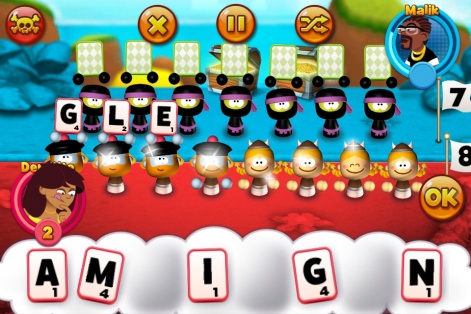
How did the current UTV publishing deal come about?
Jamie Firth: The game had been funded originally by a third-party and had sort of got stuck in limbo.
Shane Bettenhausen and I at Ignition had seen the game and fallen in love with it: we relentlessly brought it up for discussion at any apt opportunity with management.
We loved their ethos of thinking of games as 'virtual toys' and there was just so much soul and charm about the game: I knew that just by looking at the opening titles sequence.
The conversations were long and complex - it took around a year to finalise from the time we first saw it! - but eventually we were able to get a deal agreed where we essentially took over the property from the other party and re-engaged Denki to continue and complete their game.
For the record - and I know people are expected to say this!- Quarrel is genuinely one of my favourite games of all time, and Denki are my development idols.
Were there any features you didn't have time/resources to complete?
GP: There are a lot of different features that didn't make it, partly as part of the process of exploring ideas, partly due to circumstances but also because some things just didnt work.
For example, we tried out lots of different power ups, like remote attacks, letter and word score modifiers, timer modifiers, but too many of these things upset the balance of play, which is why we ended up focussing on the one power up - Backup Troops - in the end.
We tested out so many different rules and variations, like what to do in the event of tie something that felt fair and was easily understood. We explored so many troop types and opponent characters and all these different board layouts and location themes before settling on whatever we liked most for longest.
We see Quarrel as a game that can keep on growing. There are dozens of different ways to play that we identified but didn't explore, let alone the additional rules and features and variations of play possible with whats already established. I'm pretty sure if we revisited the power ups we could make more of those work, too.
Can you shed any light on the lack of multiplayer?
JF: Obviously, the ability to play against your friends is something that almost every single piece of feedback we have received.
People are so attuned to being able to play word games in multiplayer, I think people expected it to be there. However, there's a couple of things that make it less straight-forwards than perhaps people have thought about.
Real time multiplayer for example, playing online with a friend - isnt really feasible: how often do you have the 20mins to actually sit down and play on your iOS device uninterrupted?
Turn based multiplayer, a la Words with Friends etc, seems like it would work, but I can assure you that if it did then it would have been included in the release.
We have experimented with it, but because of the strategy elements it really breaks up the fun: if you have to wait 3 hours for an opponent to play a move, only to find that they have simply transferred some troops, that gets a bit tedious.
Traditional word games have no real 'long-game': you basically only play each turn at a time. Quarrel doesn't work like this, and by breaking it up into single moves you really disrupt the flow of the game.
In contrast to Garys 'Fat Duck' analogy earlier, multiplayer Quarrel is something that feels like it should work, but doesn't in its current form and we just weren't happy diluting the experience that everyone has been so happy with.
However, I will say that there are ways that Quarrel can work between friends, and well be talking about that at some point in the near future. Stay tuned.
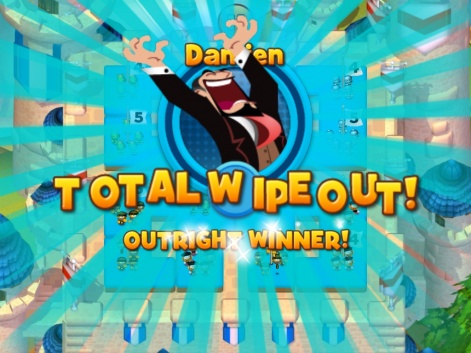
Can you give a rough breakdown of the development time and any significant tools you used?
GP: The very first rough and ready prototype took a week or so. A refined, extended prototype with crude networking took about three weeks. The idea there was to make it easier to use real players to help shape the artificial ones.
The first 3D version took about 12 weeks probably longer, in fact, because we used it in conjunction with a crude 2D version for testing out different ideas for board layouts, which took time to test effectively, especially when the fundamental rules were established.
Asymmetrical layouts, for example, didn't tend to work unless they were; too many territories meant that games dragged on.
The Xbox conversion took just over a year in the end. The iOS versions took about 16 weeks in total.
The board game was the most significant tool we used. It developed and evolved in parallel with the early versions. The board game started out purely as a design tool to test out ideas without a code bottleneck, but it turned into a cracking game in its own right.
What was nice about the board game was being able to implement rules and features in an instant. You have an idea for a new power up? You can make it right there and then.
We used the board game to prototype and evolve everything from features and board layouts to the artificial players. For the opponents, different team members played roles like impulsive, cautious, moron, bookwork, bully, coward and so on; everyone played in character and we'd assess how those characters would be obvious to real players through the way they played.
How and why did the Harper Collins deal come about?
GP: We knew from our early exploration that not only did we need the best possible word list but also a definition for every word.
It was incredibly annoying when the game didnt know real words that you knew and it was a pain having to look up the meaning of unknown words. Weird words are far more plausible with a definition. We did use our own word list at first, but it just wasnt practical to make our own definition for every word, so...
Scrabble is still the world's best known and best loved word game and its official dictionary is widely regarded as the best in the world for word games, so it made sense to target that.
JF: So many times I have had arguments with people about words that they been allowed to play in other word games, but I find that if I can turn round and say, "But this is THE dictionary for word games". Then they can have no arguments.
At what point did you realise you had come up with something special?
GP: There were glimmers of special from the outset it felt like panning for gold sometimes but it really hit home just how special Quarrel was when we saw people outside of Denki play it and become possessed by it.
I was recently reminded of just how carried away people can get playing Quarrel when we had a competition with 20 Spanish students as part of their alternative methods of learning English. Wow.
They got it and got into it real quick and then things got real feisty. It was a spectacle to behold.

What part of Quarrel are you most happy with?
GP: Other than the fact that it's out there at last....I like the amount of stage management that goes on behind the scenes to make play as fair and fun as possible.
I won't explain too many specifics because it spoils the illusion, but we went to great lengths to make sure that play isnt too random and is as rich as possible. For example, we make sure that we dont use too many anagrams that yield very few possible words, because its no fun trying to find a needle in a haystack.
We took the time to go through the word list and tag the words according to commonality: words we felt that most people knew - which turned out to be around 6,000 words, words we knew but werent sure about their meaning - around 30,000, and then everything else, which is basically 'WTF' - a staggering 75 percent.
That meant we could control which words are used when along with the artificial player vocabularies.
How's the launch gone and what sort of feedback have you got?
GP: The feedback's been enthusiastic fanatical at times, from both press and players alike.
JF: The fact that it was featured by mainstream press like the Guardian, BBC Click and the Metro was fantastic.
To get traditional games press like Edge, Eurogamer and IGN reviewing it really well, and giving it as much attention as traditional console releases was amazing and, we like to think, really clarified the quality of the product.
Do you find the free version has been feeding consumers effectively to the paid version?
JF: What we've found is that Quarrel is a concept people are unsure about, but once people have it in their hands and understand the concept, they are hooked.
I think it was really important to allow people to experience a little taste of the game in order to make their minds up.
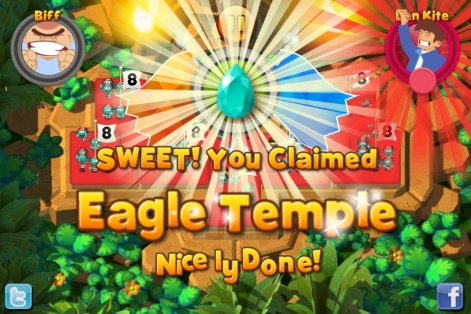
What do you think is the biggest lesson you've learnt from Quarrel?
GP: Now theres a question that requires some thought. You know what? I dont know at the moment. We havent conducted a post mortem yet but we will, so thats when I should find out.
What's next for Denki and Quarrel?
GP: At Denki there's a lot bubbling under and a few things coming to the boil.
As satisfying as it was make something as cerebrally stimulating as Quarrel and finally see it released into the wild, theres a definite desire here to try something different, something more physical, more action-based.
JF: As for Quarrel, watch this space. There are other versions very much on the cards, as well as some key updates for the existing version on multiple platforms. I'd also love to see the board game that started the whole thing released.
Thanks to Gary and Jamie for their time.

